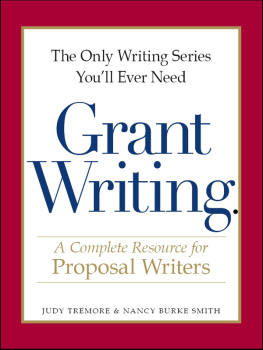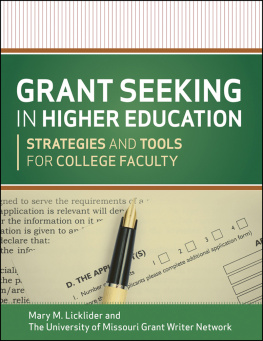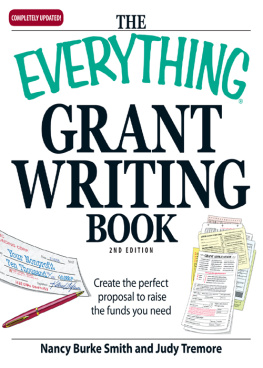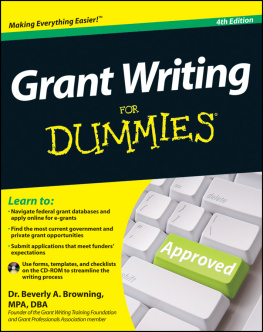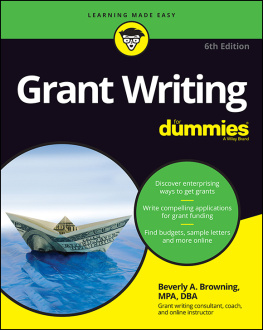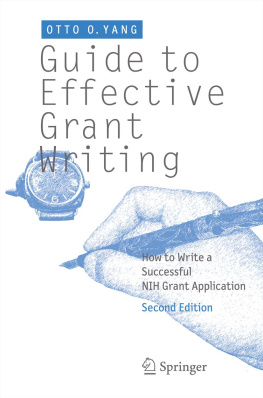About the Authors
Rekha S. Rajan is associate professor and program leader for the Grant Writing, Management, and Evaluation program in the division of research and doctoral programs at Concordia University Chicago. She is an arts education specialist, and received her doctorate in music education from Teachers College, Columbia University. As a senior research associate with the Center for Arts Education Research at Teachers College, Columbia University, she co-authored over thirty program evaluation reports. She is the author of the books Integrating the Performing Arts in Grades K5 (SAGE) and the forthcoming Childrens Experiences in Musical Theater.
Dr. Rajan has given numerous workshops on the basics of writing and getting grants, including presentations with the Arts and Business Council of Chicago. She is the recipient of multiple regional and national grants, including the National Endowment for the Arts. She is Co-Program Chair for the Teaching of Evaluation Topical Interest Group for the American Evaluation Association is an active member of the Grant Professionals Association.
Daniel Tomal is Distinguished Professor of Leadership at Concordia University Chicago, River Forest, Illinois. He has been a public high school teacher, administrator, corporate vice president, and professor. He received his BS and MAE degrees in education from Ball State University and a PhD in Educational Administration and Supervision from Bowling Green State University. He has consulted for numerous schools, has testified before the U.S. Congress, and was voted outstanding teacher at Purdue University. Dr. Tomal has authored seventeen books and over 200 articles and research studies.
He has made guest appearances on numerous radio and television shows such as CBSs This Morning; NBCs Cover to Cover, Les Brown, Joan Rivers, and Tom Snyder; CBNs 700 Club; ABC News; and WYLLs Chicago Talks. He is also author of the following books: Action Research for Educators, a CHOICE Outstanding Academic Title; School Resource Management: Optimizing Fiscal, Facilities, and Human Resources (with Craig Schilling); Human Resource Management and Collective Bargaining (with Craig Schilling); and The Teacher Leader (with Craig Schilling and Robert Wilhite).
Acknowledgments
T here are many people who helped shape our ideasboth musically and academicallyand we are grateful for this support, expertise, and inspiration. This book is dedicated to our colleagues at Concordia University Chicago who have provided feedback, comments, and encouragement. And, to the students enrolled in the masters in grant writing, management, and evaluation program, whose innovative ideas will compose the future of grant writing and program evaluation.
We would like to thank the important people in our lives: Rekhas husband, Kumar Bharat Rajan, PhD, and their three young children, Jagan Rajan, Madhavi Rajan, and Arjun Rajan; and Dans wife and children, Annette Tomal, PhD, Jonathan (and Sarah) Tomal, BA, Stephanie Tomal, JD, and Justin Tomal, MD.
Its not over until the fat lady sings
Appendix A GRANT PROFESSIONALS ASSOCIATION CODE OF ETHICS AND STANDARDS
Members, among others, are to:
- Practice their profession with the highest sense of integrity, honesty, and truthfulness to maintain and broaden public confidence
- Adhere to all applicable laws and regulations in all aspects of grantsmanship
- Continually improve their professional knowledge and skills
- Promote positive relationships between grant professionals and their stakeholders
- Value the privacy, freedom, choice and interests of all those affected by their actions
- Ensure that funds are solicited according to program guidelines
- Adhere to acceptable means of compensation for services performed; pro bono work is encouraged
- Foster cultural diversity and pluralistic values and treat all people with dignity and respect
- Become leaders and role models in the field of grantsmanship
- Encourage colleagues to embrace and practice GPAs Code of Ethics and Standards of Professional Practice.
STANDARDS OF PROFESSIONAL PRACTICE
As members respect and honor the above principles and guidelines established by the GPA Code of Ethics, any infringement or breach of standards outlined in the Code are subject to disciplinary sanctions, including expulsion, to be determined by a committee elected by their peers.
PROFESSIONAL OBLIGATIONS
- Members shall act according to the highest ethical standards of their institution, profession, and conscience.
- Members shall obey all applicable local, state, provincial, and federal civil and criminal laws and regulations.
- Members shall avoid the appearance of any criminal offense or professional misconduct.
- Members shall disclose all relationships that might constitute, or appear to constitute, conflicts of interest.
- Members shall not be associated directly or indirectly with any service, product, individuals, or organizations in a way that they know is misleading.
- Members shall not abuse any relationship with a donor, prospect, volunteer or employee to the benefit of the member or the members organization.
- Members shall recognize their individual boundaries of competence and are forthcoming and truthful about their professional experience, knowledge and expertise.
- Members shall continually strive to improve their personal competence.
Source: Grant Professionals Association, 2014
Appendix B GRANT PUBLIC LAW 106-107
T he Grants Policy Committee (GPC), a committee of the U.S. Chief Financial Officers Council, has responsibility for coordinating government-wide streamlining and simplification activities for federal grants and cooperative agreements. The GPC recommends financial assistance policies and practices to the Office of Management and Budget and coordinates related interagency activities.
The GPCs improvement efforts gained significant momentum when the committee assumed responsibility for coordinating government-wide implementation of P.L. 106-107, the Federal Financial Management Assistance Act of 1999, which had improving the effectiveness of federal financial assistance programs, coordination and streamlining as its primary goals. While P.L. 106-107 expired in November 2007, the GPC continues to build on this momentum, advancing existing efforts and leveraging new opportunities to enhance federal financial assistance.
The GPC continues its interagency coordination and its recommendations to OMB, serving the public interest in collaboration with other federal-wide grants initiatives.
Grants.gov was created to provide a single website for all federal grant opportunities. It was called for from the Presidents Management Agenda and also as part of the Public Law 106-107, which is to streamline and simplify the way the federal government does grants. It simplifies the grants management process by providing a central online system to find and apply for grants across the federal government.
When you receive a grant or cooperative agreement award, it lists general terms and conditions, such as Office of Management and Budget Circulars, agency regulations implementing government-wide requirements. Currently you can find the OMB requirements on OMBs home page, and may be able to find the agencys regulations at the agencys website or by a search of the Code of Federal Regulations (CFR). Recently OMB established a new Title 2 in the CFR as part of government-wide streamlining activities. The plan for Title 2 is to enable you to find all OMB Circulars and guidance to the agencies and the agency regulations implementing them in that single title. This will be accomplished over the next several years as the streamlining progresses.



